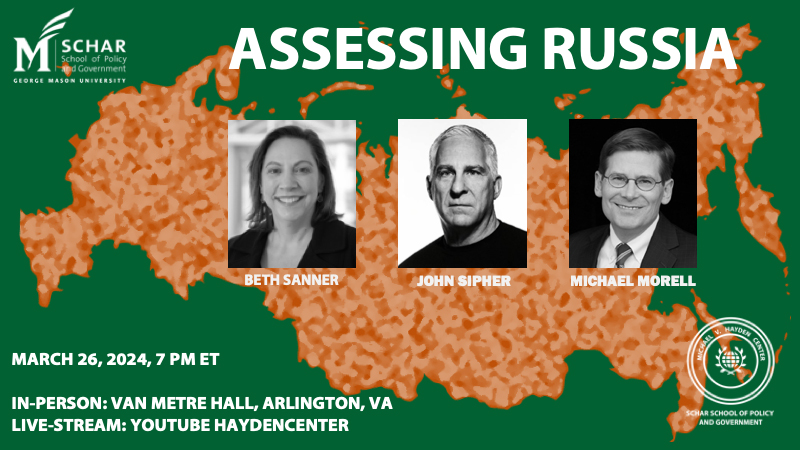
Tuesday’s in-person event hosted by the Michael V. Hayden Center for Intelligence, Policy, and National Security brings to Mason Square’s Van Metre Hall stage in Arlington, Virginia, two former leaders of U.S. intelligence agencies in a program called “Assessing Russia.”
Why Russia? “Russia is always timely while there is a massive war going on in Europe,” said John Sipher, former Russian operations leader of the CIA.
Sipher will be joined on stage by Beth Sanner, former deputy director of national intelligence for integration and a former presidential daily intelligence briefer. Their conversation, moderated by former Schar School distinguished visiting professor and former acting director of the CIA Michael J. Morell, will address past, present, and future challenges facing the world as Vladimir Putin continues to prosecute a war against Ukraine while attempting to disrupt democracies around the globe.
Clearly, there is much to discuss, ranging from economic sanctions, internal politics, and the nuclear threat. Additionally, Sipher references a recent Financial Times story suggesting the White House compel Ukraine to stop attacks inside Russian territory.
“It’s creating quite a stir among supporters of Ukraine,” said Sipher, who spent 28 years at the CIA. “There is a tendency in Washington to overreact to Putin's threats. There is a battle amongst those who follow Putin and Russia whether we need to treat him like a normal head of state and avoid having him lose face or give him off ramps.
“Others believe just the opposite, that he is akin to a mafia boss who needs to lose.”
Sanner, a former CIA analyst with 35 years’ experience at the CIA, suggests that Ukraine is “facing a potential battlefield inflection point where U.S. actions are among the most determinant—it's important to step back and assess where Putin wants to go from here, including the broader global, long-term implications of a Russian victory over Ukraine.
“History will surely consider this watershed moment through a lens that includes the 75th-anniversary NATO summit here in Washington in July as well as efforts by Russia and its partners to reshape the post-World War II world order that NATO and other institutions have protected and preserved.”
Sipher said there are “three radically different views on how to proceed” regarding Russia.
“The Trump people want to give Putin a free hand. The [Biden] administration seems to want to thread the needle and help Ukraine, but not too much so as to avoid a clash with Russia. And Ukraine, Eastern European, and Russian neighbors believe that victory is possible and we [the U.S.] need to provide more support and weaponry.
“Seems like a good time to discuss this stuff.”
Assessing Russia takes place Tuesday, March 26, at 7 p.m. at Van Metre Hall at Mason Square in Arlington, Virginia. The event is open to all but registration is required.
